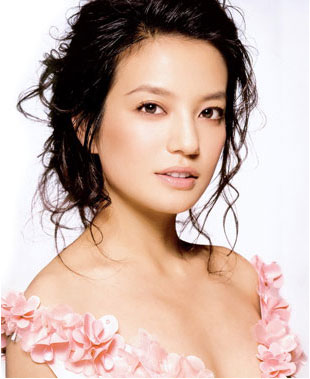Zhao Wei, a pop idol's journey to fight routine
 0 Comment(s)
0 Comment(s) Print
Print E-mail Xinhua, June 13, 2013
E-mail Xinhua, June 13, 2013
|
|
|
Zhao Wei [File photo] |
After finally entering the plush offices on the 19th-floor in a prosperous district of Beijing ahead of an interview, actress and director Zhao Wei was standing looking around at a loss.
The large room was decorated with souvenirs and trophies, but looked to have been ignored by its owner and was in need of a good reorganization. "I don't come here often," the 37-year-old explained.
She led us into a meeting room on the other side of the floor.
Zhao, the director of the romantic drama "So Young," has been too busy to visit her offices here because of a series of overseas promotional events and interviews.
Her directorial debut, a low-budget movie, is set on a college campus in the mid-1990s and has taken more than 710 million yuan (115.8 million U.S. dollars) in ticket sales in China since its release on April 26, according to statistics from China Film News.
Zhao is the first female director, whose debut film has broken the 100 million yuan mark in China.
The film's earnings nearly matched that of "Iron Man 3," which raked in 750 million yuan after about four weeks.
On the night before "So Young" was released, Zhao was a little bit nervous. "But not that nervous," said the director, who is also known as Vicki Zhao. "The entire team had worked so hard in making the film."
Zhao attributed the movie's success at the box office to the rarity of the drama, which centered on early adulthood and was able to move audiences.
"Chinese people have long been encouraged to move forward, but the film chose to look back on the your youthful days for things that matter in life," Zhao said.
"So Young" not only resonated with the lives of young moviegoers but also struck a chord with the middle-aged and over.
On the popular microblogging service Sina Weibo, more than 9.4 million posts discussing the film and early adulthood had been written as of Saturday.
The sensation is a lot more than what Zhao could have expected.
No one would have imagined the Little Swallow, the nickname of "Princess Pearl," which she portrayed in popular TV series "Huan Zhu Ge Ge," might one day become a director.
Zhao was catapulted to fame after "Princess Pearl" was first shown in China in 1998, when she was just a sophomore at the Beijing Film Academy.
In the years to follow, Zhao not only played roles in an array of films including Stephen Chow's comedy "Shaolin Soccer" (2001) and John Woo's epic "Red Cliff" (2008), but also released a couple of popular albums like "Swallow " (1999) and "Angel's Suitcase" (2007).
"No one's success happens accidentally and I encountered good times when I was young," she said.
At the end of 1990s, domestic TV dramas were flourishing in China, resulting in the creation of many idols. Zhao was one of the best known thanks to "Princess Pearl."
In 2006, Zhao went back to Beijing Film Academy and became a postgraduate student pursuing a degree in directing.
"If I didn't make a change then, I would have lost my passion. You will grow impassive if you stand in the spotlight long enough."
It can be difficult becoming a director as an actor or actress, but for Zhao it was not.
"I really enjoy being a director," she said. "The only difference between acting and directing lies in their responsibilities."
Considering herself as an idealist, Zhao was demanding about every single detail in her first directorial work.
Away from films Zhao enjoys reading. Like most of her peers, she is a fan of Louis Cha, a renowned Chinese writer who specialized in martial arts novels when she was a teenager.
But movies are not far away from her thoughts. Films conveying humanistic value are her favorites. "I like Ang Lee's movies very much, like 'The Wedding Banquet' and 'Pushing Hands'," she said. For foreign movies, Zhao likes Iranian films such as "The Children of Heaven."
Moving forward, Zhao said she will devote herself to making domestic movies that convey values in humanity because the domestic market has huge potential for this category.
"The inherent value these kinds of films carry can be communicated and embraced by people in nations around the world," she said.
Epic films have been rulers of the Chinese box office after Zhang Yimou's "Hero" became a hit in 2002. However, in the past two years, light comedies and dramas have been thriving.
Two movies, "Lost in Thailand," a low-budget comedy by local director Xu Zheng and "Journey to the West: Conquering the Demons," a period adventure comedy by Stephen Chow, raked in more than 1.2 billion yuan in China.
Though Zhao has been successful in her first directorial work, there is no timetable for a second movie.
Zhao will play an eccentric artist in her next movie. "I'm reading some books on depression to prepare myself for the role," she said. "It will be another challenge in my life."







Go to Forum >>0 Comment(s)